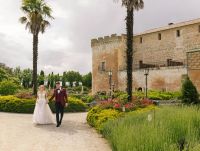Tie the knot in Spain
Check out the kind of wedding packages you can choose from when you decide to get married in Spain with Peach Perfect Weddings.
Small wedding
Even when you’re traveling miles away from home to have a destination wedding in Spain, why not bring a small group of up to 60 people to your celebration.
Elopement
Lose yourself in one of Spain’s majestic venues when you tie the knot in this European country’s diverse landscapes. Make it a lot more simple by bringing only a handful of your closest guests.
Vow renewal
Renew your vows in a historic palace or a beachfront hotel, and remember the love that you’ve had since the beginning. Do that in an unforgettable way through a vow renewal in Spain.
Your destination wedding planner in Spain
Our caring and capable destination wedding planner in Spain commit to guide you as you plan your most special day in Spain. Let her give you the peace of mind that you need from the planning stage to the arrival of your micro wedding.

With her decades of experience in the events industry, Jill is now Peach Perfect Weddings' dedicated planner for weddings on the Balearic Islands and the rest of Spain who helps couples achieve their dream wedding in these Spanish islands.
Couples' reviews

From the moment we met our wonderful PPW wedding planner, Jill Canney, our experience was nothing short of magical. Jill truly made our wedding possible. [...] She took the time to understand our vision, priorities, and budget—and was incredibly organized, detail-oriented, and communicative throughout.

Since we met Jill for our wedding in Spain, we knew we were doing it and dropped other vendors we were exploring. [...] Everything we needed, she was there with high energy and professionalism. Thank you Jill, you captured our wishes and dreams and made them happen in our big day!
Why have a destination wedding in Spain?
Diverse landscape
Spain’s vast landscape includes beautiful cliffs and mountainous peaks, old villages perched on hill tops, scenic beaches and modern iconic infrastructures. For adventurous couples looking for a unique way to get married in Spain, the autonomous northern region of Basque Country should be a top priority with its dramatic clifftops, modern architecture mixed with villages straight out of fairytales, and Ibiza with its epic nightlife.
Couples who prefer medieval and historic venues will find the “Pazos” of Galicia (splendid stone manor houses surrounded by vibrant gardens) to be the perfect venue for their small destination wedding in Spain. For lovers of the sun and sea - a beach elopement in Spain is for you! The beaches of northern Bilbao is where you’ll find scenic coastlines, competing in beauty with the southeast of Almería where the most flawless and least crowded beaches of Spain are located.

Art & history
The richness of Spanish arts is a product of centuries of evolution from the Golden Age, the Greco-Roman times, and the Renaissance, which all led to the extravagant Baroque historic art. These works of art are preserved as World Heritage Sites, making Spain the third country across the globe with the highest number of heritage sites. As of today, Spain has 47 recognised sites which are all very special and beautiful spots to have a photoshoot for your elopement in Spain. You may want to have a photoshoot with the artfully designed Guggenheim museum in the background. It's an iconic titanium-clad museum located in Bilbao that you should visit during your Spanish honeymoon or as a pre-wedding activity for your elopement in Spain.

Rich culture & fiestas
Every region you visit in Spain will prove its rich culture, well-kept traditions, and festive atmosphere. One of Spain's richly preserved traditions is the popular dance called Flamenco, which found its roots in several folklore music. In Seville, you’ll find the best Flamenco dancers who can teach you how to perform this traditional dance. Make it your official wedding dance to incorporate an authentic Spanish tradition to your elopement in Spain. Spanish fiestas are also a big part of the country's rich culture. One of the most popular is the Sanfermines in Pamplona fiesta that the Catholics celebrate for an entire week every July.

The Balearic Islands
Separated from the rest of Spain by the Balearic sea, Mallorca, Menorca, Ibiza, and Formentera compose the scenic Balearic Islands in Spain. They are sought after wedding destinations largely because of their world-class beaches and the Mediterranean climate that is good all year round. Compared to other European destinations, Spain has milder winters that are great for year-end and first quarter micro weddings. Have an unforgettable wedding celebration in the international party destination, Ibiza, or hold an intimate wedding in Mallorca’s pretty vineyards, sunny beaches, and quaint mountain villages. A destination wedding on the Balearic Islands has so much to offer to travelholic couples who want a unique experience in Spain.

When to get married in Spain?
Spring
If you don’t want to mix with the crowd, March to May is a good time to have a micro wedding in Spain. It’s during this spring season that there are fewer crowds and the weather gets pleasantly warm and mostly clear. It’s also during this time that natives observe abundant festivals.
Summer
June to August is considered the peak season in Spain where most tourists visit the country. If you prefer to join the influx of people that bring a festive atmosphere here, summer is the best time to have your elopement in Spain. Go to the beach spots in San Sebastian, Barcelona, Bilbao, Galicia, Ibiza, and on the skirts of Spain and say your I do’s there.
Autumn
Autumn in Spain begins in September and lasts until November. It’s when the temperature starts to cool off and the crowds decrease in number. At this time, the weather is also kinder so a trip around Spain will be more endurable. September is also the best time to enjoy Spanish wines since it marks the season for wine tasting of the year’s harvest.
Winter
The winter season in Spain lasts from December to February. This period is considered low season so expect the travel costs to be cheaper. The only exception is the Christmas period when many cities get very busy, and prices of venues and accommodations automatically increase. The winter weather in the northern and central Spain can get chilly, whilst the southern parts remain mild.
Types of wedding venues in Spain
Historic churches
If you’re a Catholic who wants to experience walking down the aisle in an old church steeped in history, then Spain is definitely a preferable country for your destination wedding in Europe. The Catholic church has a very important position in Spain, resulting in the preservation of many stunning centuries-old churches here. Take a look at our venue pages to see the complete list of our hand-picked wedding locations in Spain that you can hire for your micro wedding. If you’re looking for something more specific, you can get in touch with us so we can suggest the best wedding venues for your special day!

Boutique hotels
In Seville, Madrid, and Barcelona, you can find the finest Spanish wedding hotels set in vibrant urban locations, some of which lend a panoramic view of the colorful houses and buildings in Spain. They offer a grand wedding experience inside their palatial reception halls and lavishly decorated function rooms. The restaurants inside serve gourmet Spanish dishes, sorbetes and delectable cocktails for a memorable wedding reception in Spain. For couples who want an outdoor ceremony with scenic city views, choose the boutique hotels with outdoor terraces, inner courtyards, and botanical gardens.

Wineries & bodegas
Probably the most unique type of wedding venues in Spain are bodegas and wineries. As a popular wine-producing country, this is a big and thriving industry in Spain, that owners of the most successful wineries and bodegas have also ventured into the world of weddings. They expanded their properties to include function rooms and outdoor areas that are perfect for a beautiful micro wedding in Spain. You can find the most elegant ones in Salamanca, Catalonia, and Barcelona with huge historic gardens, breathtaking vineyards, and reception rooms filled with decorated wine barrels. Some wineries even constructed luxury hotels right next to their bodegas to compete with boutique wedding hotels in Spain.

Museums & heritage sites
There are museums in Spain that allow wedding ceremonies inside their buildings. One of them was built in the 19th-century with horse-drawn carriages and harnesses on display. Imagine having them on the background when you get married in Spain. If you want an artistic vibe for your Spanish wedding ceremony, say your “I dos” in the old city of Salamanca, a world heritage site with Romanesque, Moorish, Renaissance and Baroque monuments. You’ll find the same historic vibe in Santiago de Compostela, another declared heritage site where Spanish Christians and Muslims fought a religious war.

Stately villas
If you’re the type who loves wedding locations with a historic vibe, you’ll fall in love with Spanish villas built centuries ago, operating with their own wineries in the region of Andalusia. Despite their age, these venues for micro wedding in Spain were revived to include modern facilities such as reception rooms, swimming pools, and lovely terraces. The interiors of these buildings, however, remain faithful to the essence of old palatial mansions. Some of them have courtyards and fresh gardens where you can hold a romantic outdoor wedding in Spain.

Beaches, gardens, forests & mountains
Along the Atlantic Ocean and the Mediterranean Sea, you'll find Bilbao and San Sebastian, the most visited regions in Spain because of their golden beaches, lush hillsides, and alluring dining scenes. They are perfect for couples who love the beach, nature, and Spanish food. Aside from beaches and hilltop elopement spots, Spain also offers the snowy mountains and scenic cliffs of Andalusia as interesting elopement locations for adventurous couples. In these mountains, you'll find concealed forests and botanical gardens where you can have a symbolic ceremony for a guaranteed unique destination elopement in Spain.

Types of wedding ceremonies
Civil
Legalizing your wedding in Spain (i.e. having the marriage legally registered here) can be complicated due to the strict requirements set out under Spanish laws. Unlike other European countries, Spain does not allow non-residents to have a legally-binding wedding here. At least one of the partners needs to have a Spanish nationality or be a Spanish resident for a minimum of two consecutive years. In light of these stringent requirements, we advise that you take care of the legal paperwork in your home country (which is always the easiest option) and hold a meaningful symbolic ceremony at your chosen wedding venue in Spain.
Religious
To get around the civil marriage regulations, you can opt for a Catholic wedding in Spain. A Catholic church wedding is recognized as a legal wedding here as long as you comply with the Catholic church requirements (a pre-nuptial enquiry; certificates of Baptism, Communion and Confirmation issued by the local church; Free to Marry permission from your parish; and a special permit from your Bishop to get married in a Spanish church). By doing so, you can skip the 2-year residency requirement and still have your church wedding in Spain considered legal by the Spanish government. Just make sure you deliver your marriage documents to the local Spanish Civil Registry within one week after the ceremony. And for the last step, you can register this marriage in Spain in your home country. Take note that Jewish, Islamic and Protestant weddings are also considered legal marriages in Spain as long as they are performed by a licensed marriage officer.
Symbolic
Most couples choose to have a symbolic wedding ceremony for their destination wedding in Spain because it involves zero paperwork and you do not need to comply with any rules or regulations. Another bonus is that Symbolic ceremonies are highly customisable and you can make it as formal or as light-hearted as you want. As the name suggests, symbolic weddings don’t carry any legal effect in them, so you will need to take care of this step separately. We suggest to arrange the legalities of your marriage in your home country (this is best done before the symbolic ceremony) and come to Spain for a memorable micro wedding in your chosen Spanish wedding venue.
Legal Requirements
The age requirement for weddings in Spain is 18 years old for both the groom and the bride. Weddings can only happen between two consenting individuals. A civil ceremony is allowed only if at least one of the spouses meets the 2-year residency requirement. Otherwise, you’d have to get married in a religious ceremony to make your marriage legally-binding. However, as mentioned earlier, foreign citizens who are not resident in Spain cannot get legally married here. Here are the rest of the requirements for legal weddings in Spain.
Spanish food & drinks
Spanish wine

You can expect the best wine varieties to be served in your wedding reception when you get married in Spain. This popular wine-producing country is dotted with winery wedding venues that guarantee a luxurious drinking experience for your big day. But even when you don’t choose a winery for wedding venue, you can still have the finest wines from Spain’s 69 wine regions for your celebration. These wine varieties are complete with fruity, earthy, and chocolatey taste.
Seafood platter

Expect tons of seafood dishes to be served on your reception table when getting married in Spain. One popular dish that originated from this country and spread out across the world is the dish called paella. It’s a rice meal covered in shellfish, clams, prawns, mussels, and langoustines seasoned with lots of garlic, tomatoes, onions, and sweet paprika! Spanish venues also serve salt baked fish with potatoes and oven baked sea bass with vegetables along with other alternative seafood dishes.
Sorbet

In Spanish weddings, there’s a special palette cleanser called sorbet that is served in between meals. It’s a frozen dessert made of sugar-sweetened water kissed by flavourful ingredients such as honey, puree, and fruit juice. The most popular sorbet is the sorbete de limón al cava served in fancy Spanish restaurants.
Tapas

One thing that Spain is known for is their tapas - small portions of various types of local food served as appetizers. In Spanish bars, tapas come free with your ordered drinks. Tapas make an excellent companion to the post-ceremony drinks reception and work equally well as a late night snack. For your destination wedding or elopement in Spain, expect the venues to serve cocktails with matching cold and hot canapes for starters.
Spanish wedding traditions
The arras

The arras are 13 unity coins kept in a pretty container which is part of the Spanish Catholic wedding ceremony. These coins are blessed days before the marriage by the priest who is usually the same officiant for the Spanish wedding ceremony. The literal meaning of arras in Spain is earnest money or bride price. But nowadays, it symbolizes the couple’s commitment to share their wealth during the marriage. This Spanish wedding tradition is also observed in other Latin American countries and in the Philippines.
Groom’s tie for sale

Another unique Spanish wedding tradition is the cutting of the groom’s tie. This is done by the closest friends of the groom who then sell the pieces to the guests who would give money for the newlyweds in exchange for the tie. Obviously, there’s nothing so special about the groom’s tie. It’s not the expensive material that they are paying for. They do this to bless the couple with monetary gifts.
Wedding ‘til the Break of dawn

Be warned! Weddings in Spain go on LATE, probably because the Spanish laws allow their citizens to enjoy a 15-day paid leave from work after getting married. That’s why 2 days for the wedding does not hurt that much. If in the US guests start to say goodbye after a few rounds of drinks, in Spain, drinks start to overflow at 4am. Thanks to cities like Barcelona and Madrid, and the Balearic Islands with their unbeatable nightlife, there are some amazing places for those who wish to celebrate ‘til break of dawn!
Cake & the espada

Unlike in American and Asian weddings, the cakes at Spanish weddings are not so grand and huge. They are usually single-tier cakes with a minimalist design. The game changer however, is the cake slicing ceremony where the couple uses a long traditional sword called the espada to cut the cake. The use of sword is believed to be a Roman tradition that the Spanish natives still observe. Why not include this in your reception program when you get married in Spain?
Getting in & around Spain
Airport
With 47 public airports scattered in several Spanish entry points, it will be very easy for you and your guests to reach the venue of your small wedding in Spain. For instance, If you choose to get married in the beach wedding venues along the northern coast of Spain, you can arrive in Bilbao Airport. For a gorgeous Barcelona wedding in the northeastern Spain, the El Prat Airport is ready to serve you. On the south is another popular airport in Costa del Sol - the Malaga airport which are minutes away from historic wedding hotels in Spain, specifically in the region of Andalucia.
Rent a car
If you prefer a more private form of transportation, go for a rental car. It’s perfect for couples who are planning to explore the country after their destination wedding in Spain. This option will allow you to have a DIY itinerary and to plan your own route in the streets of Spain. The quality of roads throughout Spain is excellent, even on minor country roads between small towns and villages - just don’t forget your international driver’s licence and credit card!
Train
If your chosen wedding venue in Spain is far from the airport, there’s no reason to worry. Spain has one of the largest-scale high-speed train networks on the continent, which is the second most extensive and the third fastest in the whole world. Spain’s RENFE operates regular services around the country and in the neighbouring countries of Portugal and France.
By bus
Adventurous couples like you can easily reach off-the-beaten-path wedding venues in Spain when you travel by bus. While on the road, you can drop by some interesting spots in the rural areas of Spain that are not accessible via train. Convenience would be the least of your worries because Spain has a centralised road system consisting of six highways connecting Madrid to the Basque Country, Valencia, Catalonia, Extremadura, West Andalusia, and Galicia.
Cost of getting married or eloping in Spain
The cost of travelling to Spain would be around 80-175 euros per person per day and around 1,500 - 2,000 euros per week. Getting married in Spain is relatively cheaper than marrying in other European destinations like Switzerland, Italy, France, or UK because of the higher competition, thus lowering the rates of wedding suppliers. Even weddings in the scenic Balearic Islands could be more cost-efficient. Check out our wedding packages to get a better grasp of the cost of a organising you destination wedding in Spain. You can also try our package builder to get an instant quote for your customised wedding package. For a relatively lower elopement cost, get married in Spain in winter season when travel costs and wedding venue rates are cheaper. Head on to our site to see our list of venues for weddings in Spain, and get a quotation too.
Our all-inclusive packages for elopements and small weddings in Spain
























